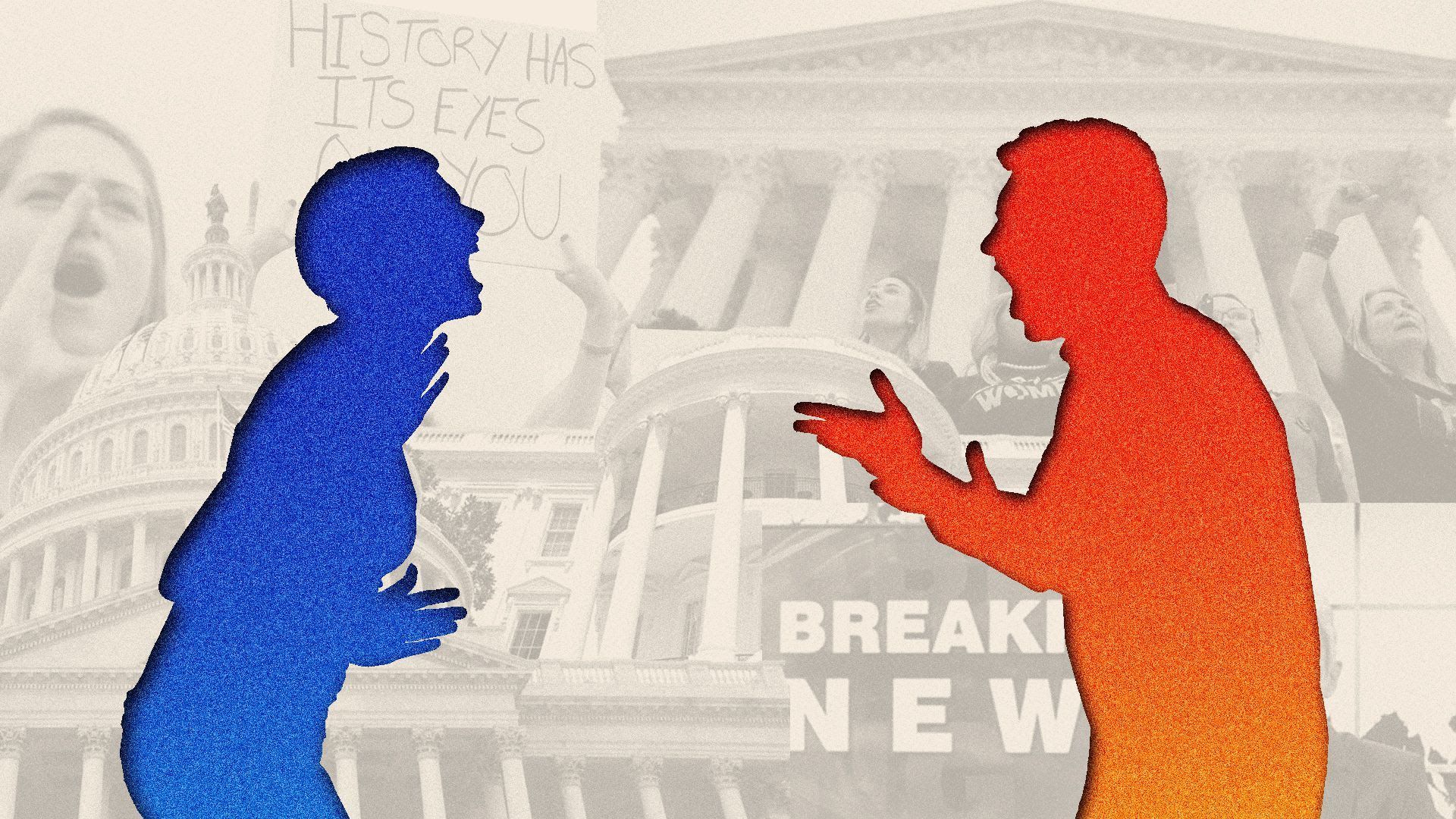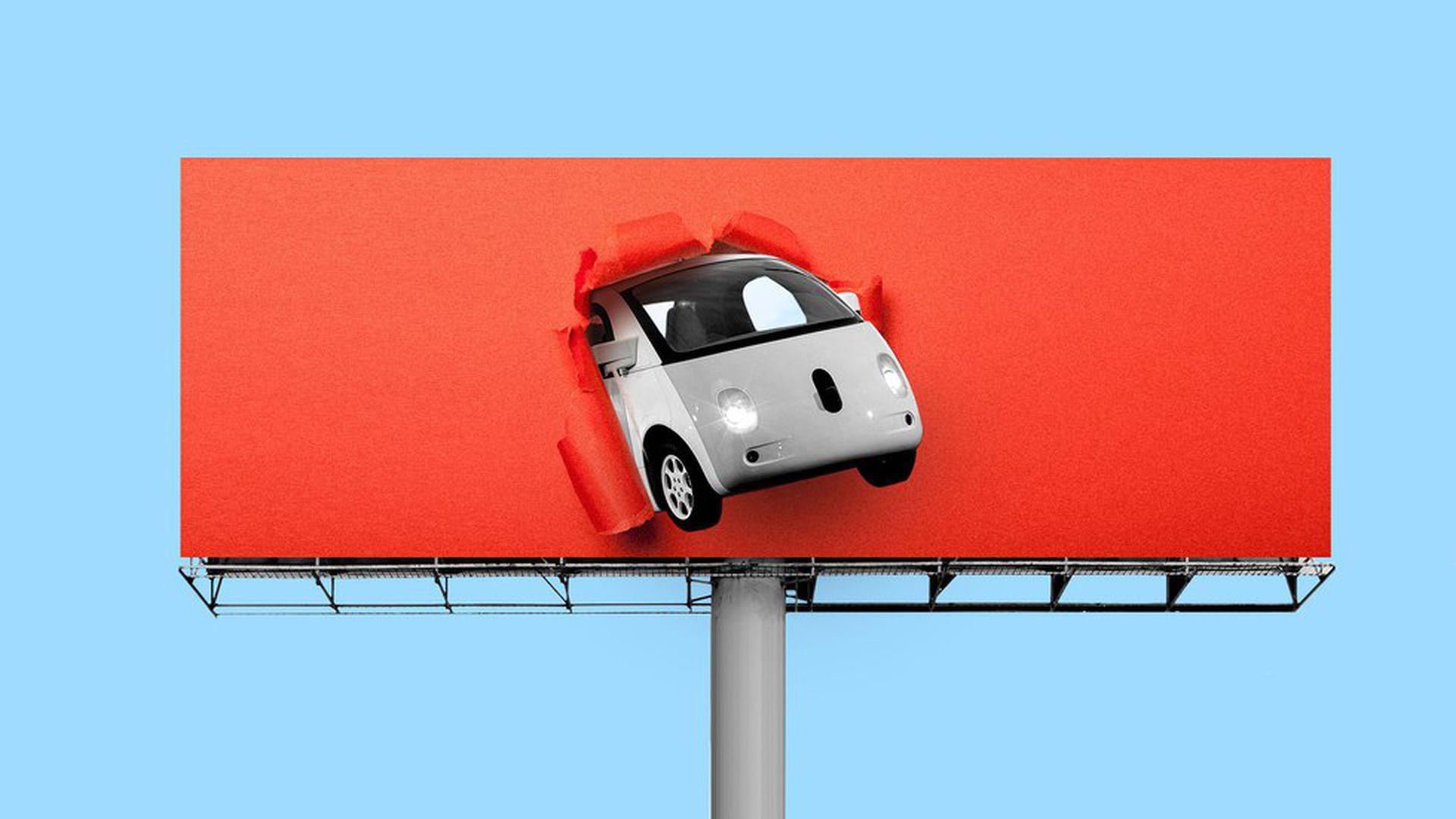Axios Media Trends

October 30, 2018
Thanks for subscribing to Media Trends. Tell friends to follow along by signing up here.
Axios on HBO debuts this Sunday at 6:30 p.m. The first episode will feature an exclusive interview with President Trump. First look.
1 big thing: The media battle over radicalization
Illustration: Sarah Grillo/Axios
Tragic events ahead of the midterms are causing a contentious media blame game over who to blame for the increasing radicalization of American citizens.
Why it matters: The media infighting is itself the byproduct of a nation that's become radicalized by a collision of geopolitical events over years, and it's being compounded by an economic crisis around news, where the most profitable information online and on TV is often the most inflammatory.
- Mainstream media hosts and columnists are pointing the finger at certain Fox News and Fox Business personalities for peddling bogus pro-Trump talking points leading up to the midterms.
- Conservative media and the Trump administration are arguing that the mainstream media is obsessed with anti-Trump coverage, pointing to certain headlines and chyrons as examples of editorialized coverage.
- Others are slamming social media companies for creating a breeding ground for people to spread conspiracy theories and hate.
Between the lines: The blame game is coming to a head at Fox News, where news and opinion programming differs, but viewers often struggle to discern the difference between the two. In the last week:
- Fox News anchor Shep Smith rebuked comments coming from the president and some at his own network Monday about the risk posed by a caravan of migrants, arguing the rhetoric is a ploy to rally people ahead of the midterms.
- Fox News political analyst Brit Hume, speaking at a Washington free press event on Thursday, called out the popularity of Fox's opinion coverage, but noted that there's also a separate, independent news team. "Chris (Wallace) is a part of that, I'm a part of that and Bret Baier is a part of that and many of our colleagues here in this room are a part of that as well. And we take a real pride in what we do and we believe we're a first-rate news organization."
- Even Matt Drudge, founder and editor of the right-leaning Drudge Report, issued a rare rebuke on Monday of Fox News after host Lisa Kennedy Montgomery laughed during a segment about Saturday's mass shooting at a Pittsburgh synagogue.
- A Fox News spokesperson said that "Kennedy made an unrelated quip at the end of the segment which was focused on unity — there was absolutely no joking or laughing about the events of this weekend and a screen grab of her smiling is hardly indicative of the entire segment. The lower third should not have been up for the duration of this segment as it was not fully reflective of what the panelists were discussing."
The bigger picture: Axios Future Editor Steve Levine notes in a feature on democracy that similar geopolitical and technological forces are causing radicalized information environments and populations around the world.
- "Across the democratic West — in the U.S., Britain, Hungary, Italy, Sweden and more — the two-year eruption of public wrath has been exceptionally volatile and, for those attempting to grasp and address it, vexing."
Yes, but: In some cases, the infighting is putting pressure on players in the media ecosystem to make changes that might improve the quality of coverage and conversation moving forward. For example, Twitter says it's considering banning "likes" in an effort to incentivize healthier conversations on the platform.
What's next: Experts predict that the radicalization of Western populations will only get worse, and in places like the U.S., it will continue to force people to take on tribal mentalities, which will continue to be reflected in the media.
2. Exclusive: The Athletic raises $40 million
The Athletic Twitter
The Athletic, a subscription-based digital sports media company, raised $40 million in a series C funding round.
- With this investment, the company has raised a total of $70 million since its launch in 2016, and is valued at roughly $200 million, according to sources familiar with the deal.
Why it matters: The company, which makes money from consumer subscriptions, thinks it can meet high growth expectations from venture capitalists, many currently facing poor returns on investments in ad-based digital media companies.
Details: The round is being co-led by Founders Fund, a San Francisco-based venture capital firm that specializes in technology, and Bedrock Capital, a venture capital firm that specializes in early stage investments. Sources say Founders Fund has contributed a larger investment.
- Other participants in the round include former backers like Comcast Ventures, Evolution Media Capital, Courtside Ventures, The Chernin Group, Y Combinator, Advancit and Luminari, as well as new investors like Amasia and BDMI.
- While Peter Thiel is a founding partner at Founders Fund, sources say he's not directly involved in the deal. The Athletic confirmed that partner Napolean Ta is brokering the deal.
- The money will be used to invest in audience, data and editorial teams that drive subscriptions, per Athletic co-founder Alex Mather, as well as podcasts and video teams. Prior funds were used to poach veteran sports journalists with big salaries.
Between the lines: The founders pitch The Athletic as both a direct-to-consumer brand and a digital media company.
By the numbers: The company has 300 full-time employees, over 100,000 subscribers and a 90% renewal rate. It's roughly the same size as The Los Angeles Times' digital subscription audience, but is 30 times smaller than The New York Times'.
- The Athletic has journalists covering sports in 47 markets (up from 12 in January). Mather says most of its new markets are profitable, and its older markets are growing roughly 10% year over year.
3. Media and ad industries brace for driverless future
Illustration: Rebecca Zisser/Axios
The media and advertising industries are anxiously awaiting driverless cars, hoping they will create more opportunities to serve more people more content.
Between the lines: It's not clear if or when people will be able to fully take their eyes off the road to consume more content. The media industry is planning for all scenarios.
- Right now, driverless cars require drivers to pay attention. As they become more autonomous, the level of attention needed would likely change.
- Most models have screens in the car, but some are designed to help drivers pay more attention to the road by offering better directions, places to stop, etc.
- "Others are built for passengers that don't need to pay attention to driving whatsoever," said Daniel Castro, vice president at the Information Technology and Innovation Foundation. Those options could include more binge-watching opportunities or even games.
The big question: Right now, drivers own their own data. But because cars will have different levels of driver participation, there's no consensus around the future of data ownership.
- In the future, the car company could own the data (think GM or Ford, who already ask consumers to opt-in so they can share their data with retailers). In the shared economy (think Uber or Lyft), the ride-sharing service could own it. If stricter privacy laws are enacted, the consumer could own it.
The bottom line: Whoever owns the data will ultimately decide who controls the content and ads — or at least who gets the revenue.
Go deeper: How privacy plays into all of this.
4. Ad loads rising despite network push to cut back


TV networks that are trying to cut back on ads are having trouble shedding that ad load, according to a Pivotal Research analysis of Nielsen data, highlighted in GroupM's most recent video report. Overall, total US ad load keeps rising.
Why it matters: TV networks like Fox, NBC and Turner have all vowed to cut back on ad load, in an attempt to lure back viewers who are abandoning linear TV in droves for ad-free streaming platforms.
5. The world's first "digital tax" puts big tech on edge
Illustration: Sarah Grillo/Axios
The U.K. government plans to introduce a new "digital services tax" in 2020 that would force big American companies like Google, Amazon and Facebook to pay a tax of 2% of their British revenue, which mostly comes from ads.
Why it matters: The tax, which is expected to raise £400 million annually, is inspiring other international efforts to levy stiffer corporate taxes that would hit U.S. tech giants hard.
- South Korea, India and at least seven other Asian-Pacific countries are exploring new taxes, the Wall Street Journal reports. "Mexico, Chile, and other Latin American countries are contemplating new taxes aimed at boosting receipts from foreign tech firms."
Details: The U.K. tax would apply to profitable companies making at least £500 million ($640 million) annually in revenue. Unprofitable companies like Netflix and Uber would be exempt.
The big picture: Some global tech companies have perfected the art of moving profits to countries with low tax rates. In response, countries are proposing to tax revenue instead of profits. That's because it's much harder for a company to move revenue than it is to move profits.
- The Organization for Economic Cooperation and Development has been working on coordinating a new international tax system, but the process is moving slowly.
- The U.K. and others want to speed it up by saying that they'll implement unilateral taxes if the OECD doesn't act by 2020.
Go deeper: Felix and I have more in the Axios stream
6. AT&T's new media overhaul
AT&T is wasting no time building its big Netflix competitor, which it hopes will be the anchor of its media business, WarnerMedia (formerly Time Warner).
Over the past two weeks, WarnerMedia started that consolidation, shuting down three digital video services that catered to niche audiences:
- FilmStruck, Turner’s indie subscription video service that launched in 2016
- Super Deluxe, Turner’s comedy-centric digital turned TV studio that was first acquired in 2006, folded into Adult Swim, and then revitalized in 2015
- DramaFever, Warner Bros.’ streaming-video service specializing in Korean dramas and Asian programming
Why it matters: Executives believe that a Netflix-like subscription video platform, that includes evergreen content in a library of franchise-driven titles, will be the driver of WarnerMedia’s success. (WarnerMedia is now one of the four core pillars of AT&T’s business.)
The big picture: AT&T CEO Randall Stephenson has said that capital reallocation is a part of the company’s strategy to boost its streaming efforts.
- Positive earnings suggest that WarrnerMedia is doing well in its early days under the AT&T umbrella. But it still has a long way to go in consolidating its services enough to be able to foot the bill for streaming empire.
Go deeper: Verizon vs. AT&T: A tale of two media investments
7. 1 🐾 thing: How Paw Patrol took over kids' entertainment
Photo by Victor Chavez/Getty Images
With kids TV ratings in decline, a glut of shows on streaming services and the demise of Toys "R" Us, Paw Patrol may be the last dominant children's entertainment franchise, according to Bloomberg's Gerry Smith.
- In a new piece, Smith says the cartoon about rescue puppies generates more than $1 billion a year, raking in the largest share of U.S. licensed merchandise sales from kids under 15, topping Disney’s Frozen and Star Wars.
- "Now in its fifth season on Viacom Inc.’s Nickelodeon and Nick Jr., Paw Patrol is the most-watched television show for preschoolers this year, according to Nielsen, and Viacom estimates the show has generated about $7 billion in global retail sales."
Go deeper. “I have not seen anything like this in preschool in all of my years.”
Sign up for Axios Media Trends

Sara Fischer’s inside look at the forces reshaping media.




